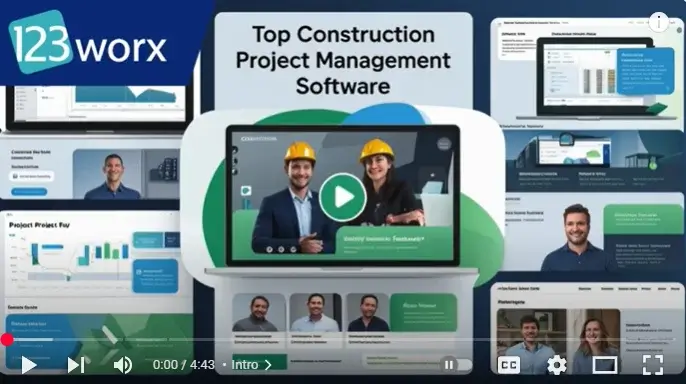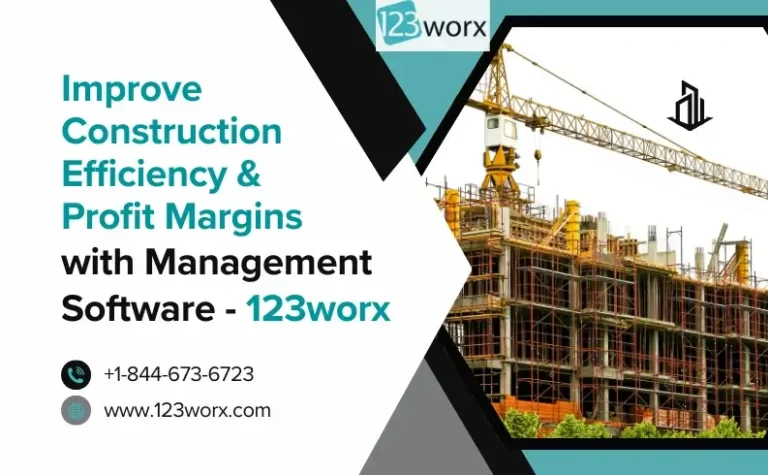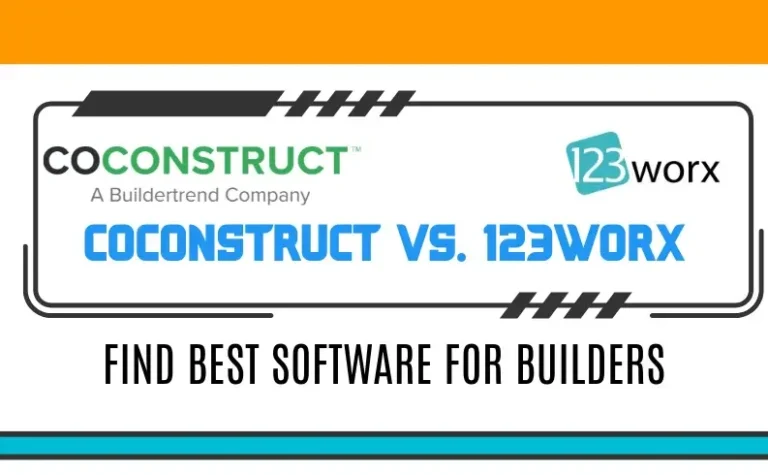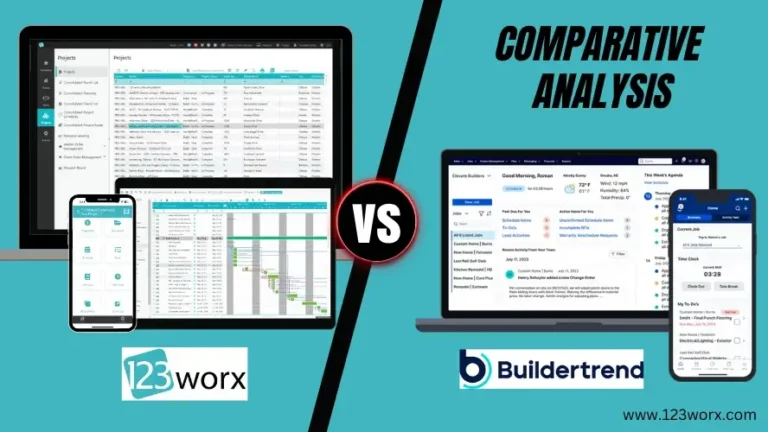The Importance of Project Management Software in Construction
Construction project management software is key in construction. In the modern, fast-moving, and complex construction industry, these tools are integral to efficient and organized operations. They simplify processes, boost communication, and increase effectiveness at every stage of construction.
Builders reduce mistakes and control costs while tracking work time through construction project management software, which centralizes information and automates work processes with real-time updates. Digital solutions become essential for construction businesses to compete in the expanding industry while delivering superior work.
Choosing the Right Tool for Your Construction Projects
The abundance of software options makes it difficult for businesses to identify their best-fit solution. Each platform incorporates tools targeted at specific business types to handle tasks ranging from managing costs to controlling documents and coordinating field activities.
Here are the top 10 best construction project management software options: 123worx, Procore, Autodesk Construction Cloud, Fieldwire, Buildxact, Contractor Foreman, Buildertrend, ConConstruct, PlanGrid, & JobTred.
Watch the Full Video Breakdown For the Top 10 Construction Platforms
Let’s dive into deep details about features to help General Contractors in 2025 so that they can select a good construction tool to streamline their business and ensure project success according to their need.
Top 10 Construction Project Management Software For Contractors in 2025
- 123worx – Best All-in-One for Residential Builders & Remodelers
- Procore – Best Overall for Large Contractors
- Autodesk Construction Cloud – Best for Document Control
- Fieldwire – Best for Field Management
- Buildxact – Best for Custom Home Builders
- Contractor Foreman – Best for Budget-Conscious Small to Mid Contractors
- Buildertrend – Best Cloud-Based Option for Remodelers & Custom Builders
- CoConstruct – Best for Custom Home Builders & Design-Build Firms
- PlanGrid – Best for Blueprint & Field Markups
- JobTread – Best for Complete Estimation-to-Project Workflow
Each tool offers unique features tailored to different contractor needs, from comprehensive project management to specialized document control and field operations. Let’s dive deep into the details.
1. 123worx: Best All-in-One for Residential Builders & Remodelers
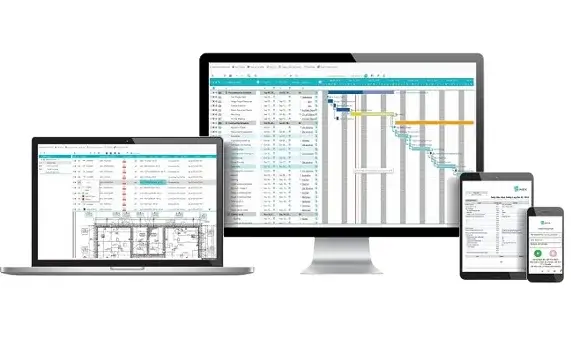
Why it’s the best: 123worx construction business management software is developed to serve builders and remodelers with end-to-end project management experience. From CRM software to budgeting, QuickBooks integration, including document management. It is a one-stop solution that covers every aspect of construction project management.
Key Features:
- Customizable templates for scheduling, budgeting, and document management.
- Integrated QuickBooks synchronization for financial tracking.
- Detailed tools for estimating, scheduling, change orders, and asset management.
- An extensive list of features capable of handling many different types of workflows
Pros:
- Comprehensive features tailored for builders, including CRM, project tracking, and budget management
- Highly adaptable to fit the user’s specific workflows.
- User-friendly design, making it accessible for various team members
Cons:
- Learning curve for new users due to the depth of features
Why contractors love it:
123worx offers an extensive suite of features that smaller or medium-sized contractors can customize for their unique needs, including tools to manage everything from client relationships to asset bookings.
Role-Based Access Control:
123worx includes robust permission management, enabling construction companies to limit user access based on role. Project managers, accounting teams, and clients see only the data relevant to their tasks.
{Hey, looking for the budget management for your projects – Find a List of the top 10 construction estimating software}
2. Procore: Best Overall for Large Contractors
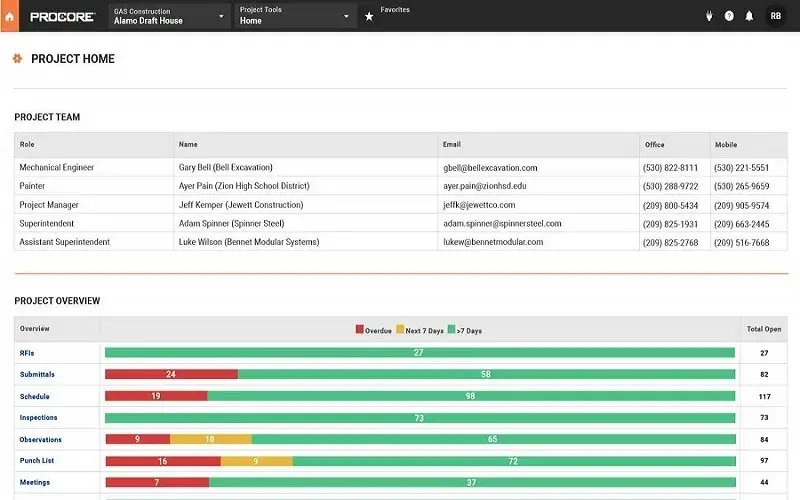
source – procore.com
Why It is The Best: Procore is a complete project management platform, perfect for big contractors or companies. With applications for all tasks from budgeting to team coordination, it works smoothly with a wide range of accounting and ERP systems.
Key Features:
- Budgeting, scheduling, and resource tracking in one platform.
- Strong integration with QuickBooks, Sage, and other financial tools.
- Excellent mobile app usability for on-the-go access.
- Collaboration tools that connect office and field teams in real time.
Pros:
- Highly user-friendly and seamless interface, requiring minimal clicks
- Excellent project insights and task management capabilities, facilitating efficient decision-making
- Centralized document tracking helps manage various project documents easily
- Integration with tools like DocuSign and Sage improves workflow and reduces manual data entry
Cons:
- Can be overwhelming for new users, requiring a learning curve
- High cost may deter some users if the perceived value is low
- Potential challenges with integration and customization
Why contractors love it:
Procore’s vast suite of features is tailored to large projects, ensuring every stage of the construction process is trackable and streamlined.
Team Communication Use Case:
Procore’s collaboration tools enhance communication between subcontractors, project managers, and office staff by streamlining RFIs, submittals, and task notifications in one centralized system.
(People also search for – Procore Software Alternatives)
3. Autodesk Construction Cloud: Best for Document Control
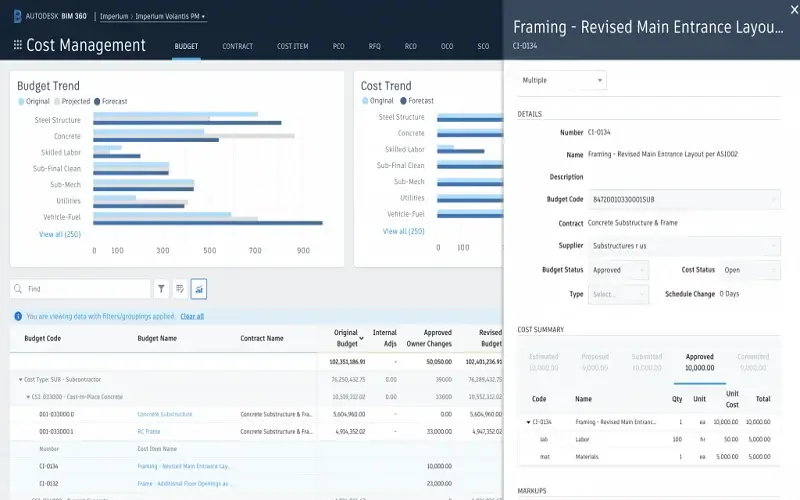
Source – construction.autodesk.com
Why It is The Best: Autodesk Construction Cloud is a pro at performing document control, giving powerful tools for managing drawings and project records. It equips builders with a simplified method to reach, distribute, and revise diagrams and files instantly, confirming everyone remains in sync.
Key Features:
- Centralized platform for blueprints and documents.
- Real-time updates ensure the latest versions are always available.
- Easy-to-use mobile app for field teams.
Pros:
- Provides real-time access to blueprints and project updates on mobile devices
- Easy to use and well-designed interface that enhances user experience
- Strong collaboration features for teams, facilitating better communication and updates
Cons:
- Potential issues with offline access, which can hinder productivity
- Some features may feel limited compared to other comprehensive construction management solutions
Why contractors love it:
The straightforward document management system of Autodesk Construction Cloud makes it the preferred choice for contractors who need to provide up-to-date information to both office staff and field workers.
Role-Specific Interfaces:
Autodesk CC customizes the dashboard view for roles like the construction manager, project engineer, and subcontractor, ensuring relevant data is always visible and actionable.
4. Fieldwire: Best for Field Management

Image Source – fieldwire.com
Why it’s the best: Fieldwire stands out as the top choice for managing field teams and their on-site tasks. Contractors favor Fieldwire for its straightforward interface, collaborative real-time features, and strong mobile app, which help maintain crew alignment.
Fieldwire works as a trusted software for coordinating field groups and on-site tasks. With its easy-to-use design, instant team collaboration options, and a strong mobile application, it is liked by contractors to keep teams aligned.
Key Features:
- Task management, punch lists, and progress tracking from any device.
- Collaboration tools that allow field workers and project managers to stay updated in real time.
- Ability to share blueprints and documents directly to the field.
Pros:
- Strong mobile functionality for accessing project information on-site
- Simplifies communication and task management within teams
- Easy to set up and use, making it ideal for smaller teams or projects
Cons:
- Limited reporting and analytics features compared to larger platforms
- Potential challenges with customization and integrations
Why contractors love it:
Fieldwire simplifies field management with real-time updates, ensuring field teams and office staff are always working off the same data.
Punch List Optimization:
Fieldwire accelerates job closeout by digitizing punch lists, allowing real-time updates, and reducing delays in finishing tasks. It’s a go-to construction software for site supervisors and foremen.
5. Buildxact: Best for Custom Home Builders

Image Source – buildxact.com
Why it’s the best: Buildxact is developed for the needs of custom home builders and general contractors, offering features for construction estimation, scheduling, and project management with a user-friendly interface. It perfectly helps builders to simplify their operations with no complications.
Key Features:
- Detailed estimating tools tailored to custom home building.
- Construction scheduling and project management tools that are easy to set up and use.
- Strong focus on cost tracking and ensuring budgets are met.
Pros:
- Focuses on estimating and project management by a project manager, suitable for small to medium builders
- User-friendly interface that makes managing projects straightforward
- Good customer support and responsive service from the team
Cons:
- Limited functionality for larger projects or companies needing advanced features
- Limited in terms of integration capabilities.
Why contractors love it:
Buildxact simplifies estimating and scheduling for custom home builders, offering an easy-to-learn toolset that helps builders run their projects smoothly.
Supplier Integration:
Buildxact integrates directly with supplier pricing catalogs, allowing builders to generate accurate estimates and place orders without leaving the platform. This improves procurement efficiency.
6. Contractor Foreman – Best for Budget-Conscious Small to mid-contractors

source – contractorforeman.com
Why It’s the Best: Contractor Foreman provides a single comprehensive solution at an economical price point that meets the needs of smaller general contractors, project managers, and specialty contractors. The software maintains its essential project management functionality while remaining affordable which establishes it as one of the most powerful contractor project management options available.
Key Features:
- Over 40 tools including scheduling, estimating, time tracking, RFIs, and safety logs.
- Seamless integration with QuickBooks and Xero.
- Cloud-based access with full mobile functionality for construction manager and team.
Pros:
- Extremely budget-friendly (plans start at $49/month).
- Great customer support and onboarding materials.
- Quick setup and intuitive dashboard for non-tech-savvy users.
Cons:
- Advanced analytics and integrations may require higher-tier plans.
- Some users report slow mobile file uploads.
Why Contractors Love It:
Smaller firms love the low-cost and complete toolset, allowing them to compete with larger companies without breaking the bank. It’s a perfect construction management software for construction managers for growing businesses.
Daily Reports & Safety Compliance:
Contractor Foreman includes automated daily reporting and built-in safety forms that help specialty construction contractors ensure OSHA compliance, improve documentation and reduce liability risks.
7. Buildertrend – Best Cloud-Based Option for Remodelers & Custom Builders

source – Buildertrend.com
Why It’s the Best: Buildertrend is a leader in cloud-based construction project management software solutions tailored for residential and custom home builders. It supports everything from client communication to scheduling and budgeting, making it a favorite tool for construction professionals focused on client satisfaction.
Key Features:
- Client portal, budgeting, scheduling, CRM, and change order tracking.
- Strong mobile app for onsite access.
- Integrates with accounting platforms like QuickBooks, Xero, and Buildertrend’s proprietary tools.
Pros:
- All-in-one system with excellent collaboration tools for a construction team and clients.
- Real-time updates and communication streamline projects.
- Strong focus on construction team coordination and customer visibility.
Cons:
- The learning curve for smaller teams unfamiliar with software tools.
- Cost may be higher compared to basic tools.
Why Contractors Love It:
Custom home builders and remodelers benefit from Buildertrend when they require a professional client experience with seamless scheduling and financial management.
Portal Uses:
The client-facing portal enables users to share project updates and photos, select materials, and obtain approvals without any interruption. The system creates an open working environment that leads to better choices and strengthens trust with clients.
8. CoConstruct – Best for Custom Home Builders & Design-Build Firms

source – CoConstruct.com
Why It’s the Best: CoConstruct is tailored for custom builders, remodelers, and design-build firms needing personalized workflows. It brings together project management, client selections, financials, and team collaboration in one platform.
Key Features:
- Integrated estimating, bidding, client selections, construction scheduling, and financial tracking.
- Client portal for real-time communication.
- Integrates with QuickBooks Desktop and Online.
Pros:
- Built specifically for residential construction, not generalized software.
- Helps streamline pre-construction planning to post-build communication.
- Excellent support and onboarding resources.
Cons:
- Somewhat outdated UI compared to newer platforms.
- Reporting features could be expanded for power users.
Why Contractors Love It:
CoConstruct is loved for keeping homeowners in the loop, making it a go-to project management tool for customer-centric construction companies. It reduces delays and surprises by keeping everything transparent.
Pre‑Construction Workflow:
CoConstruct unifies all pre-construction tasks such as client selections and allowances together with project scheduling & project progress milestones which leads to better project execution transitions.
9. PlanGrid – Best for Blueprint & Field Markups
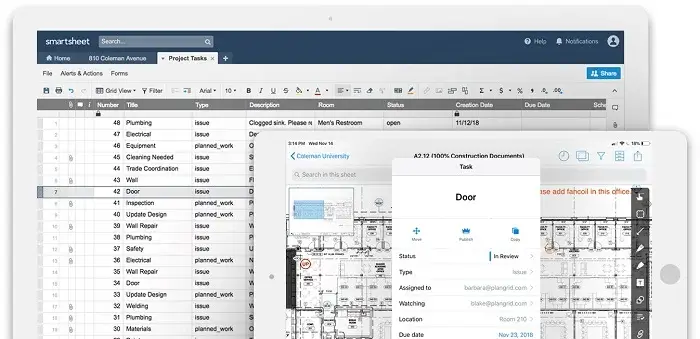
source – plangrid.com
Why It’s the Best: PlanGrid shines as a construction project management tool for teams or a construction professional needing precise field collaboration and real-time blueprint updates. Ideal for general contractors, project managers, and specialty contractors focused on on-site accuracy.
Key Features:
- Unlimited sheet and blueprint storage with markup tools
- Real-time version control across mobile and desktop
- Photo documentation, punch lists, and progress tracking
Pros:
- Instant project scheduling updates and collaboration tools; speeds up communication as a management features
- Simple interface that field staff adopt quickly
- Offline access and mobile-first design
Cons:
- A heavier emphasis on drawings may limit budgeting features
- Limited CRM or pre-sale features
Why Contractors Love It:
By keeping everyone synced through construction software, PlanGrid drastically cuts markup errors and rework.
Field Use Case
PlanGrid supports field supervisors by enabling them to mark up plans, record progress photos, and manage punch list tasks without needing an internet connection, which maintains consistent field productivity.
10. JobTread – Best for Complete Estimation-to-Project Workflow

source – JobTread.com
Why It’s the Best: JobTread is designed for remodelers and small custom home builders. JobTread bridges estimation, CRM, and field operations in a unified management tool, perfect for businesses looking for one integrated tool for project management.
Key Features:
- Job costing, proposal builder, purchase orders, scheduling, mobile field logs
- CRM integration for lead tracking and client management
- Real-time collaboration for construction teams, project timeline
Pros:
- Workflow automation from lead to completion; tight QuickBooks integration
- Affordable for small businesses or construction firms
- Easy-to-use UI that supports field and office users
Cons:
- Newer to market, feature set still growing
- They don’t have a mobile app yet
Why Contractors Love It:
Remodelers appreciate having all project phases, client acquisition, pricing, and scheduling in one cloud-based platform.
ROI Spotlight:
The custom builder from Texas managed to decrease labor expenses by 15% and improve delivery schedules by implementing JobTread automation for job costing and communication workflows.
How Construction Project Management Tools Empower Growing Builders
For small and mid-sized firms, the best construction business management software isn’t just a productivity tool; it’s a competitive edge. With fewer team members and tighter margins, you need tools that make every minute and dollar count.
- Cloud-based access lets your field crew and office stay in sync.
- Task automation means less time on paperwork and more on-site.
- Clear financial tracking helps you stay profitable even on slim projects.
Most importantly, good software helps you deliver a big-contractor experience, even with a small team, keeping clients happy and business growing.
How To Choose The Right Project Management Software?
Here’s a guide on choosing the perfect project management software for your building business.
Be sure to include these aspects:
- Business Size & Project Details: The tool must handle your usual project size and complexity.
- Specific Feature Requirements: Recognize crucial features following your process and challenges.
- Integration Compatibility: Confirm if the tool works with your third-party software system.
- User-friendly: Think about the team’s learning and comfort in using the tool.
- Mobile Features: Ensure strong mobile functions for on-site uses.
- Scalability: Select a tool that can adapt to your business growth and the needs of a construction project manager’s daily life.
- Budgeting: Reflect on initial costs and long-term ROI.
- Customer Assistance: Check the quality and availability of customer support.
When you measure these aspects, you can choose software that matches your specific requirements and boosts your project management skills.
10 Must-Have Features for Small Construction Teams
If you’re running a small to mid-sized construction business, here’s a checklist of essential features your software must have:
- Built-in estimating tools
- Simple drag-and-drop scheduling
- Client communication portal
- Mobile field reporting
- Document and photo management
- Change order tracking
- QuickBooks or Xero integration
- User role controls for smaller teams
- Daily logs & safety checklist tools
- CRM to manage leads and clients
These features help streamline tasks without the overhead of large platforms, enabling your business to stay lean, productive, and professional.
Future of Construction Project Management Software
Construction project management software is set to revolutionize the industry:
- AI Advancements: The integration of AI in the construction management industry is going to predict risks and help manage resources.
- Enhanced Reality Tech: AR and VR are going to make project visualization a breeze and remote teamwork possible.
- Contracts on Blockchain: Smart contracts are going to make agreements and payments straightforward.
- Sensor and IoT Integration: Real-time info from connected devices enhances safety and equipment management.
- Cloud-Based Collaboration: Better cloud collaboration will make smooth communications in a global network.
- Substantiality Features: Tools will have features to track and enhance project sustainability.
- Task Automation: More automation will save time for important decisions.
These improvements mean more efficient, data-focused, and team-based construction work.
Comparing The Top 10: Feature Matrix
To help you compare the top 10 construction project management software, here’s a feature matrix:
| Product | Budgeting | Scheduling | Document Control | Field Management | Mobile Access | Customization | Integration | Estimating |
|---|---|---|---|---|---|---|---|---|
| Procore | ✓✓✓ | ✓✓✓ | ✓✓ | ✓✓ | ✓✓✓ | ✓✓✓ | ✓✓✓ | ✓✓ |
| Autodesk CC | ✓✓ | ✓✓ | ✓✓✓ | ✓ | ✓✓ | ✓✓ | ✓✓ | ✓ |
| 123worx | ✓✓✓ | ✓✓✓ | ✓✓ | ✓✓ | ✓✓ | ✓✓✓ | ✓✓ | ✓✓ |
| Fieldwire | ✓ | ✓✓ | ✓✓ | ✓✓✓ | ✓✓✓ | ✓ | ✓ | ✓ |
| Buildxact | ✓✓ | ✓✓ | ✓ | ✓ | ✓✓ | ✓ | ✓ | ✓✓✓ |
| Contractor Foreman | ✓✓ | ✓✓ | ✓✓ | ✓✓✓ | ✓✓✓ | ✓✓ | ✓✓ | ✓✓✓ |
| Buildertrend | ✓✓✓ | ✓✓✓ | ✓✓ | ✓✓ | ✓✓✓ | ✓✓✓ | ✓✓✓ | ✓✓✓ |
| CoConstruct | ✓✓✓ | ✓✓ | ✓✓ | ✓ | ✓✓ | ✓✓ | ✓✓ | ✓✓✓ |
| PlanGrid | ✓ | ✓✓ | ✓✓✓ | ✓✓✓ | ✓✓✓ | ✓ | ✓ | ✓ |
| JobTread | ✓✓ | ✓✓ | ✓ | ✓✓ | ✓✓ | ✓✓ | ✓✓ | ✓✓✓ |
**✓✓✓ Excellent, ✓✓ Good, ✓ Basic
This matrix provides a quick overview of each tool’s strengths, helping you identify which solution best fits your specific needs.
Current Trends in Construction Project Management (Trends To Watch in 2025)
Construction is changing fast. Let’s discuss some key pointers outlining its future:
- AI and Machine Learning: These will help predict risks and properly assign resources.
- The Internet of Things: Makes tracking devices and site monitoring easy.
- Building Information Modelling (BIM): Increases efficiency in 3D modeling and collaboration.
- Emphasis on Sustainability: Promotes using eco-friendly materials and operations.
- Remote Work Solutions: Supports teamwork and virtual meet-ups among distributed teams.
- VR and AR Reality: Advances project visualization and training.
- Modular and Prefab Construction: Merges management for off-site building.
- Blockchain: Secures contracts and maintains transparency.
ROI of Implementing Project Management Software
Using project management tools can bring great returns to construction companies.
Let’s break it down:
- Save Time: Cut down on daily tasks and save about 5-10 hours each week for everyone on the team.
- Cut Costs: Get better at managing resources and slash project costs by 5-15.
- Reduce Error: With digital records and real-time updates, errors can drop by nearly 50.
- Improved Collaboration: Good communication can boost productivity by 20-30.
- Quick Project Completion: Streamlined work can cut project times by 10-20.
- Client Satisfaction: Better communication and project visibility can help keep clients coming back.
- Smart Choices: Real-time data means better, profitable business decisions.
Sure, the initial cost might seem high, but the long-term benefits in how smoothly things run, how accurate the work is, and how much profit you make, make project management tools a better decision for construction companies of any size.
Embracing the Future of Construction Project Management

We’ve explored the top project management tools for all kinds of contractors in 2025 and beyond. Clearly, the building industry is ready for a digital revolution. There’s a wide range from all-around software like Procore to focused ones for small-mid like 123worx. Each software can match different construction businesses, big or small. Success is based on selecting the best software that fits your unique needs, process, and growth plans.
The future for managing construction projects looks exciting with new tech like AI, IoT, and enhanced reality enhancing our methods. With these digital solutions, contractors can look forward to big boosts in efficiency, precision, and profits.
Frequently Asked Questions
1. What is construction project management software, and why is it needed?
Construction project management software is a software that helps contractors schedule, plan, budget, and communicate during all phases of a project. Workflows become streamlined, repetitive processes become automated, and the communication barrier between office staff and site workers is eradicated, all reasons why it’s important to stay on schedule and within budget.
2. What are the key features of good software used in construction?
Take into account functionality such as project scheduling, budget tracking, construction estimating, document management, real-time tracking & daily reporting. It should have quality and safety inspections, communication functionality, and integration with accounting packages such as QuickBooks or Xero like software. This functionality ensures that information flows freely and that the project is managed proactively.
3. How does construction software improve teamwork and error reduction?
Construction software with centrally documented information, versioned records, and updated in real-time allows for single-source truth, thereby reducing the incidents of rework, disputes, and miscommunication. This open communication results in higher accountability and reduced risk.
4. Can I integrate my project management software with an accounting application?
Absolutely. Most of the PM software have integration with QuickBooks, Xero, or any other accounting software that removes manual entry errors and streamlines financial processes. This ensures that your invoice and project budgets are always current with actual costs being incurred in the field.
5. Is the building software cloud-based and capable of running offline?
Yes – Modern building PM software is web-based and designed to be accessed securely from any device. Many have companion phone apps with offline capability that enable crews to edit log books and documents on the jobsite and sync up when an internet connection is restored. This allows workflows to be continuous and the data consistent.

As a Vice President at 123worx, Construction Management Platform, Bharat Rudra has worked with hundreds of business executives searching for best-suited software for their construction business with a wide array of requirements. Bharat takes pride in helping construction businesses solve their business and project management challenges. Feel free to reach Bharat if you have any questions. You can find him on LinkedIn or reach him at brudra@123worx.com


